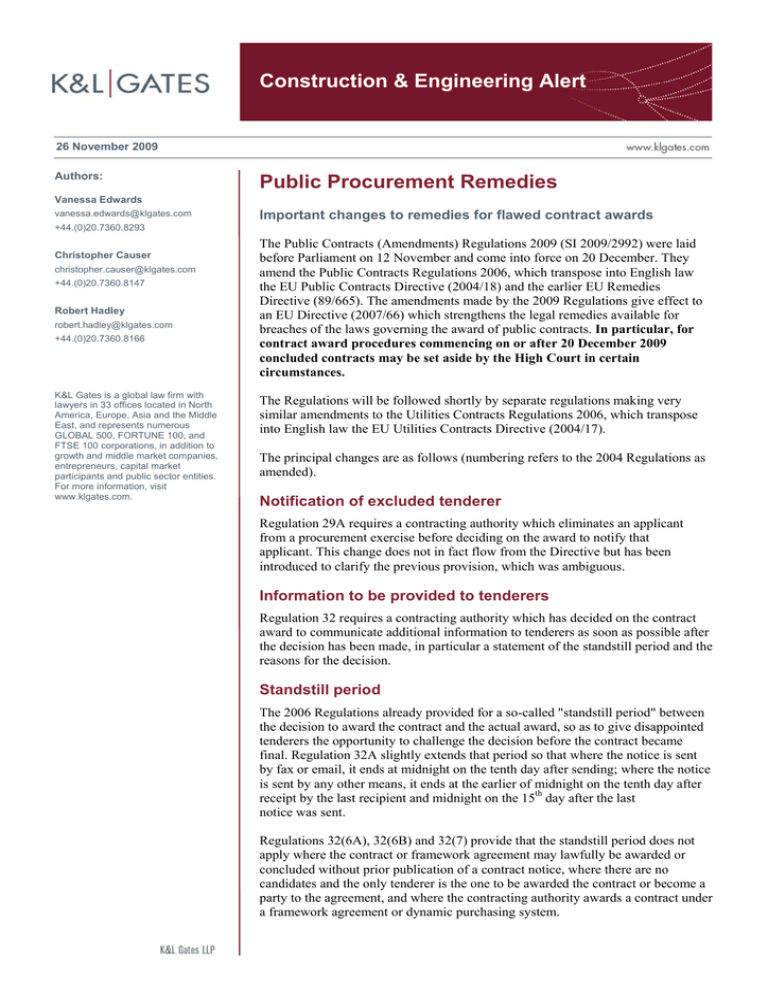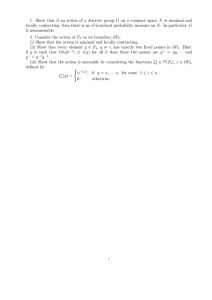
Construction & Engineering Alert
26 November 2009
Authors:
Public Procurement Remedies
Vanessa Edwards
vanessa.edwards@klgates.com
Important changes to remedies for flawed contract awards
+44.(0)20.7360.8293
Christopher Causer
christopher.causer@klgates.com
+44.(0)20.7360.8147
Robert Hadley
robert.hadley@klgates.com
+44.(0)20.7360.8166
K&L Gates is a global law firm with
lawyers in 33 offices located in North
America, Europe, Asia and the Middle
East, and represents numerous
GLOBAL 500, FORTUNE 100, and
FTSE 100 corporations, in addition to
growth and middle market companies,
entrepreneurs, capital market
participants and public sector entities.
For more information, visit
www.klgates.com.
The Public Contracts (Amendments) Regulations 2009 (SI 2009/2992) were laid
before Parliament on 12 November and come into force on 20 December. They
amend the Public Contracts Regulations 2006, which transpose into English law
the EU Public Contracts Directive (2004/18) and the earlier EU Remedies
Directive (89/665). The amendments made by the 2009 Regulations give effect to
an EU Directive (2007/66) which strengthens the legal remedies available for
breaches of the laws governing the award of public contracts. In particular, for
contract award procedures commencing on or after 20 December 2009
concluded contracts may be set aside by the High Court in certain
circumstances.
The Regulations will be followed shortly by separate regulations making very
similar amendments to the Utilities Contracts Regulations 2006, which transpose
into English law the EU Utilities Contracts Directive (2004/17).
The principal changes are as follows (numbering refers to the 2004 Regulations as
amended).
Notification of excluded tenderer
Regulation 29A requires a contracting authority which eliminates an applicant
from a procurement exercise before deciding on the award to notify that
applicant. This change does not in fact flow from the Directive but has been
introduced to clarify the previous provision, which was ambiguous.
Information to be provided to tenderers
Regulation 32 requires a contracting authority which has decided on the contract
award to communicate additional information to tenderers as soon as possible after
the decision has been made, in particular a statement of the standstill period and the
reasons for the decision.
Standstill period
The 2006 Regulations already provided for a so-called "standstill period" between
the decision to award the contract and the actual award, so as to give disappointed
tenderers the opportunity to challenge the decision before the contract became
final. Regulation 32A slightly extends that period so that where the notice is sent
by fax or email, it ends at midnight on the tenth day after sending; where the notice
is sent by any other means, it ends at the earlier of midnight on the tenth day after
receipt by the last recipient and midnight on the 15th day after the last
notice was sent.
Regulations 32(6A), 32(6B) and 32(7) provide that the standstill period does not
apply where the contract or framework agreement may lawfully be awarded or
concluded without prior publication of a contract notice, where there are no
candidates and the only tenderer is the one to be awarded the contract or become a
party to the agreement, and where the contracting authority awards a contract under
a framework agreement or dynamic purchasing system.
Construction & Engineering Alert
Time limits for starting proceedings
The basic time limit for starting proceedings
(other than proceedings seeking a declaration of
ineffectiveness) remains the same: such
proceedings "must be started promptly and in any
event within 3 months beginning with the date
when grounds for starting the proceedings first
arose, unless the court considers that there is
good reason for extending the period"
(Regulation 47D(2)). However, Regulation
47D(3) makes it clear that that provision does not
require proceedings to be started before the
expiry of periods of 10 or 15 days (depending on
the means of communication used) from
notification or publication of the decision being
challenged.
It should be noted that the time limit in
Regulation 47D(2) may need amendment
following the forthcoming judgment of the
European Court of Justice in the pending case
Uniplex v NHS Business Services Authority (Case
C-406/08). In that case, the High Court has asked
the European Court to rule on whether the time
limit is compatible with the EU law requirement
that remedies for breach of a right derived from
EU law should be effective. The Advocate
General (who in certain cases provides the judges
with a written Opinion which is generally,
although not necessarily, followed) has proposed
that the Court should rule that EU law requires
that the limitation period should not start to run
until the time at which the applicant knew or
ought to have known of the alleged infringement
of procurement law and precludes a limitation
provision which allows the national court at its
discretion to dismiss applications as inadmissible
by reference to a requirement to bring
proceedings promptly.
Regulation 47E provides that proceedings
seeking the new declaration of ineffectiveness
(see below) must be started within six months of
the date when the contract was entered into
unless the contracting authority publicises the
award and/or notifies unsuccessful tenderers, in
which case the time limit is reduced to 30 days
after publication or notification.
Suspension of the award procedure
Regulation 47G prohibits the contracting
authority from entering into a contract where
proceedings have been started to challenge the
decision to award the contract. The suspension
continues until the High Court makes an order
bringing it to an end or the High Court
proceedings challenging the decision have been
concluded.
Declaration of ineffectiveness
The most radical innovation is the requirement in
Regulation 47J for the High Court to make a
declaration of ineffectiveness - that is a
declaration that a public contract already entered
into by a contracting authority is of no effect - if
it is satisfied that a decision or action taken by a
contracting authority was in breach of the
Regulations and if any of three specified grounds
for ineffectiveness applies. These grounds are
somewhat complex; they are as follows.
First, the contract was awarded without prior
publication of a contract notice where such
publication was required. A contracting
authority which is not sure whether publication is
required may protect itself against the risk of
ineffectiveness by publishing a "voluntary
transparency notice" in the Official Journal of
the EU ("OJEU") containing prescribed
information and waiting 10 days after
publication before entering into the contract; or
Second, the contract was entered into during the
standstill period or a period of suspension, and
that deprived the applicant tenderer of the
possibility of starting proceedings, provided that
there has also been a breach of another
obligation imposed by the Regulations which has
affected the chances of the (actual or putative)
tenderer obtaining the contract; or
Third, the contract is based on a framework
agreement or dynamic purchasing system and a
number of more detailed conditions in relation to
the procedures and thresholds for the award of
such contracts are met.
Even if a ground is made out the Court must not
make a declaration of ineffectiveness if it
considers that "overriding reasons relating to a
general interest" require that the effects of the
contract be maintained. In such a case, the Court
must order instead that the duration of the
contract be shortened and/or that the contracting
authority pay a civil financial penalty of a
specified amount.
Regulation 47L(3) states that economic interests
directly linked to the contract cannot constitute
overriding reasons relating to a general
interest. There is otherwise little guidance in the
Regulations, or indeed the Directive, as to what
26 November 2009
2
Construction & Engineering Alert
may amount to overriding reasons. This area is
likely to be a fertile ground for litigation.
Practical steps for contracting
authorities
Regulation 47M provides that where a
declaration of ineffectiveness is made, the
contract is to be considered to be prospectively,
but not retrospectively, ineffective: obligations
still to be performed under the contract are
accordingly not to be performed but what has
already happened stands. The Court must also
order that the contracting authority pay a civil
financial penalty of a specified amount (which
goes to the Treasury) and may make an additional
order addressing, for example, issues of
restitution or compensation as between the
parties, so as to achieve an outcome which the
Court considers to be just in all the
circumstances.
Where a contract has been awarded and work has
started, it will clearly be disruptive and
expensive for the contract to be declared
prospectively ineffective. Contracting authorities
will therefore wish to be sure they comply with
the requirements of the Regulations throughout
the course of the procedure, and should consider
reviewing their internal procedures in general,
and their standard award letters in particular,
before the new provisions come into effect.
The Court must also make an order for a civil
financial penalty even if it does not make a
declaration of ineffectiveness (because none was
sought or because none of the grounds for
ineffectiveness applies) if it considers that the
contract was entered into during the standstill
period or a period of suspension.
Transitional measures
Conclusion
The new provisions give rise to significantly
wider opportunities for unsuccessful tenderers to
challenge contract awards by contracting
authorities. They are likely to consider the
possibility in every substantial case but will need
to be conscious of the applicable time limits.
While contracting authorities will wish to ensure
compliance, companies will want to be
considering their opportunities for redress where
they are unsuccessful in a public procurement
exercise and to act quickly where they have a
grievance.
The Regulations apply to contract award
procedures commenced on or after 20 December
2009. A contract award procedure (whether in
relation to a proposed public contract, framework
agreement or dynamic purchasing system) is
regarded as commencing when the contract
notice is sent to the OJEU; or when any form of
advertisement seeking offers or expressions of
interest is published; or when the contracting
authority contacts any company in order to seek
expressions of interest or offers or to respond to
an unsolicited expression of interest or offer.
Anchorage Austin Beijing Berlin Boston Charlotte Chicago Dallas Dubai Fort Worth Frankfurt Harrisburg Hong Kong London
Los Angeles Miami Newark New York Orange County Palo Alto Paris Pittsburgh Portland Raleigh Research Triangle Park
San Diego San Francisco Seattle Shanghai Singapore Spokane/Coeur d’Alene Taipei Washington, D.C.
K&L Gates is a global law firm with lawyers in 33 offices located in North America, Europe, Asia and the Middle East, and represents
numerous GLOBAL 500, FORTUNE 100, and FTSE 100 corporations, in addition to growth and middle market companies, entrepreneurs,
capital market participants and public sector entities. For more information, visit www.klgates.com.
K&L Gates comprises multiple affiliated partnerships: a limited liability partnership with the full name K&L Gates LLP qualified in Delaware and
maintaining offices throughout the U.S., in Berlin and Frankfurt, Germany, in Beijing (K&L Gates LLP Beijing Representative Office), in Dubai,
U.A.E., in Shanghai (K&L Gates LLP Shanghai Representative Office), and in Singapore (K&L Gates LLP Singapore Representative Office); a
limited liability partnership (also named K&L Gates LLP) incorporated in England and maintaining offices in London and Paris; a Taiwan
general partnership (K&L Gates) maintaining an office in Taipei; and a Hong Kong general partnership (K&L Gates, Solicitors) maintaining an
office in Hong Kong. K&L Gates maintains appropriate registrations in the jurisdictions in which its offices are located. A list of the partners in
each entity is available for inspection at any K&L Gates office.
This publication is for informational purposes and does not contain or convey legal advice. The information herein should not be used or relied
upon in regard to any particular facts or circumstances without first consulting a lawyer.
©2009 K&L Gates LLP. All Rights Reserved.
26 November 2009
3




